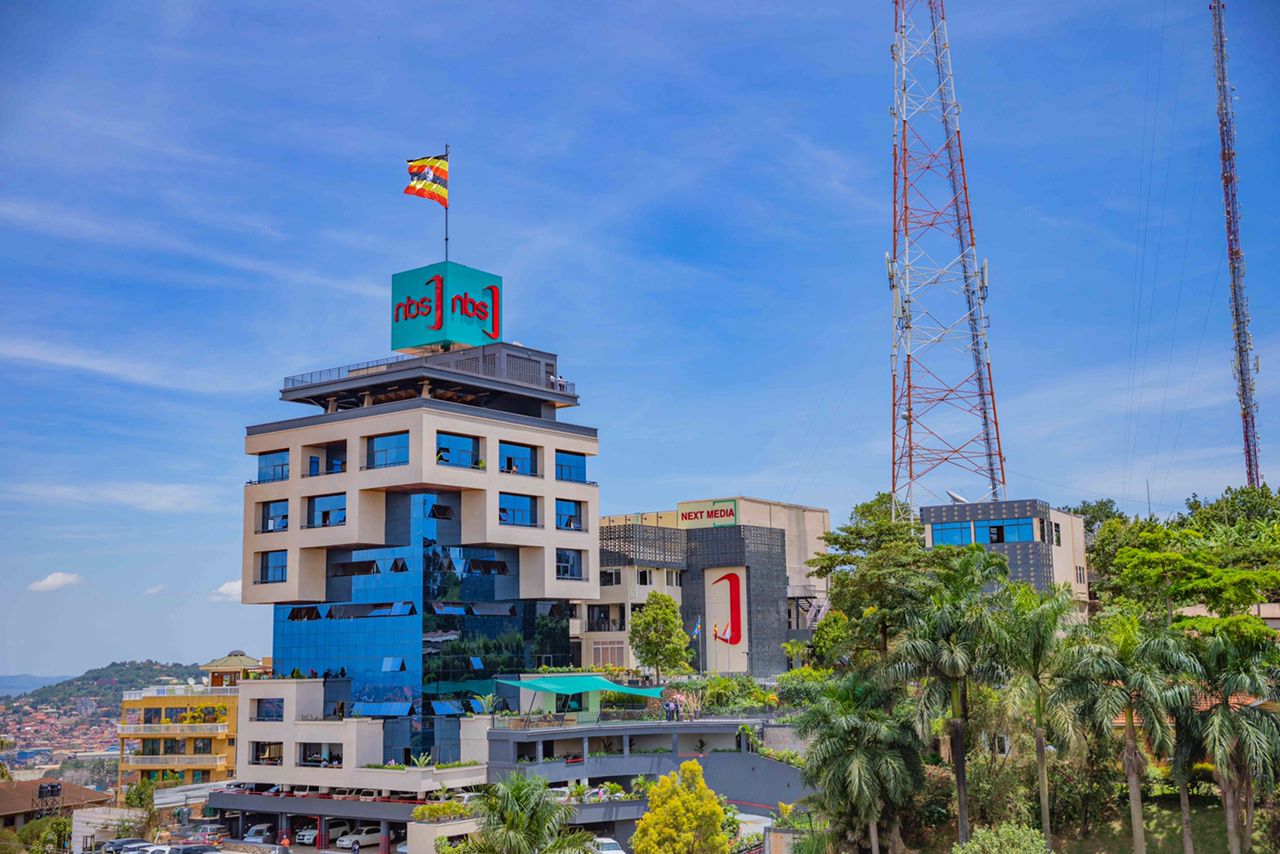In October last year, Next Media Services relaunched Sanyuka TV after 4 years on the air.
Initially, the TV whose programming was mainly in Luganda had a strong focus on sport – being the official broadcaster of the StarTimes Uganda Premier League – as well as Luganda talk shows, and entertainment segments. Sanyuka would cater for the lower-tier audience that was not interested in NBS TV’s programs.
However, three months ago, Sanyuka TV announced it was refocusing its programming with a promise “to be Uganda’s leading entertainment station, satisfying viewers aged between 18 and 35”. The relaunch themed ‘Sanyuka Munda Muli’ spoke to an entertainment-first direction.
Ramathan Mbago, the Sanyuka TV General Manager said the announcement was a culmination of careful preparation informed by market research, input from industry leaders and Sanyuka’s audience.
To revamp Sanyuka, Next Media had poached talent including Precious Remie (from at NTV), comedian Kalela (from Radio 4), Ann Taylor (from Urban TV), Sophie Love (from Baba TV) and DJ Mutesa Pro (from Radio Buddu in Masaka) and unveiled them as the fresh faces to achieve the new strategic direction.
A month prior, Next Media had officially launched its towering headquarters in Naguru – The Next Media Park – which is the home to NBS TV, NBS Sport, Sanyuka TV, Salam Television, Sanyuka Prime, Next Radio, Nile Post, Next Com, Next Production Limited, Afro Mobile and HillCom.
The media group said the launch further anchored its strategic vision to be the leading multi-media group for East Africa.
Now, Next Media Services has begun the process of segmenting its subsidiaries – NBS TV and Sanyuka TV – to ensure they each have niche programming. NBS will primarily focus on current affairs while Sanyuka will fully cater for those interested in entertainment.
A source at Next Media said NBS TV wants to position itself as the channel that a viewer who consumes CNN can watch, for round-the-clock programs that are typically about news and current affairs.
Part of this current affairs strategy will involve broadcasting daily Parliamentary plenary sessions just like UBC the national broadcaster. An insider at Next Media says the leadership at Parliament was concerned that whereas the national broadcaster airs these proceedings, these broadcasts only reach a limited audience since many Ugandans don’t consider UBC their favorite TV.
NBS TV began airing the Parliament sessions on Tuesday.
Airing live plenary sessions which start at 2pm every day would affect NBS TV’s afternoon programming which is all entertainment themed – Lunch Request (a musical request show hosted by DJ Zato), a movie and After 5 (an entertainment show hosted by Douglas Lwanga, MC Kats, Sheilah Gashumba and DJs Mercy and Roja).
Plugged understands the Parliamentary programming will begin 2pm and end 6pm. This means After 5 which aired 5pm to 7pm will lose an hour. However, from a business standpoint, NBS would derive a lot more value from Parliament buying 4 hours of airtime considering most advertisers don’t prefer afternoon slots for having fewer eyeballs.
Also at the heart of Next Media’s decision to clean NBS TV of all entertainment programs were the disruptions occasioned by breaking news that require live coverage. For example, whenever there is a Presidential address (which is always in public interest), NBS must interrupt its programming which is an inconvenience both for advertisers and the viewers, a Next Media insider revealed.
“Not everyone is interested in watching the Presidential address. Some want to watch their entertainment, and we get these complaints. So, such a viewer will tune into Sanyuka knowing they won’t be inconvenienced,” the insider said.
At the moment, After 5 will continue to air from 6pm to 7pm on NBS before it switches to Sanyuka from 7pm to 8pm. But eventually, the entire show will be moved to Sanyuka.
Other entertainment programs on NBS which will move to Sanyuka include NBS Katch Up (Friday night), Saturday Night Live (Saturday night), Pundonor Magazine, KURT among others.
To expand its entertainment palette on Sanyuka, Next Media has been courting comedy content creators including Fun Factory and Comedy Store.
But Bart Kakooza, a media consultant who has 20 years experience of TV production views NBS TV’s strategy with skepticism. He describes 24/7 current affairs broadcasting as “a nail-biting affair”.
“They won’t be able to manage. I don’t know how prepared they are. It is a taxing venture. I did that while I did news on LTV, I did it with CNN, and I know what it takes,” Kakooza told Plugged on Wednesday.
“You must have the personnel – the reporters, the producers and program producers – whom I don’t think they have. The thing about television in Uganda is, it has been hijacked by mediocrity. People who just come and talk about things when they have not researched. They end up interviewing people when they really have no idea,” he says.
The caliber of talent on TV today requires retooling if they are to ably relay good quality reportage of current affairs, he says. In his view, the advent of social media has aggravated the problem by watering down journalistic principles.
“I don’t know what they are planning to feed us on. Unless they are going to feed us on garbage. But if they really want to give us substance, then they must train their reporters.”
That notwithstanding, Kakooza believes Next Media has the technology needed for timely coverage. NBS TV has since the 2015 Pope’s visit and the 2016 general elections, positioned itself as the market leader in live coverage.
The internet has birthed citizen journalism empowering everyone to break the news. And this has left traditional media playing catchup. By the time TV airs its primetime news, the viewer already has a grip on the story.
For broadcasters to thrive, they must treat social media as a source of news tips rather than regurgitating what the audience already knows, Kakooza argues.
Streaming and on-demand services have not only posed a threat to TV in terms of content, they have also split eyeballs and subsequently spread advertising revenue thin. Local TVs have traditionally depended on advertising to sustain their running costs. Save for those that get funding from the government, churches or other investors.
“In order to run such a 24-hour news channel, effectively on our standards in Uganda, you need at least Shs 15m every day. CNN spends about $100,000 (Shs 368m) every day. So, you can imagine,” he says.
“Look at MTN. How much budget do they have for media advertisement for the whole year? Maybe Shs 300m? How many TV stations, newspapers, and radio stations are you going to share it with? And how many such advertisers do we have? It’s not sustainable,” says Kakooza who is managing director for Media Plus Ltd, a television production company and independent television agency.
Kakooza has vast experience in television, including producing CNN’s Inside Africa program for the Great Lakes Region. He also worked with various television production companies in Europe and U.S. on projects that featured on BBC, CNN, Aljazeera as well as Irish and Polish channels. Initially, he was a war correspondent with UTV.
Next Media has been preparing its advertisers for the migration, which according to Mark Ahebwa, the publicist for Next Media Services, is planned to be finalized in March.
He says for the majority of these brands (advertisers), the mass market is their primary audience, and Sanyuka is where this audience is.
“When you look at Sanyuka, it’s your ordinary person. Most corporate companies are tilting towards touching the base of these clusters of people. Of course, there are those standard ones that should be a constant on an NBS brand. There’s an ongoing assessment,” Ahebwa told Plugged.
Besides advertisement, local TVs depend on affiliate fees – a percentage of what subscribers pay to Pay-Tv content providers such as MultiChoice and StarTimes, paid to the content owners on a per-subscriber basis. However, these fees are negligible compared to how much TVs and their co-producing entities invest in creating this content.
It’s for this reason that Next Media monetized its content streaming platform, AfroMobile App, by charging subscription fees (Shs 5,000) per month. It is likely the media group will soon eye ads on the platform.








